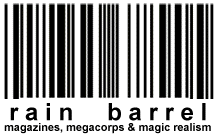
March 30, 2001

March 30, 2001
|
After the first test of the Atomic bomb, Dr. J. Robert Oppenheimer quoted the Bhagavad-Gita as he said "I am become Death, the Destroyer of Worlds". And after Ray Kurzweil speculates upon the future of artificial intelligence, he pronounces "The Singularity is Near". Huh?
Well, in mathematics, "it's the point then a function goes infinite". But to Ray Kurzweil and Vernor Vinge singularity occurs when computers with artificial intelligence become smarter than humans and..
When I read projections like those by Kurzweil in the most recent issue of WIRED, that 'brain-augmented scientists, tempered by vocal Luddites, will cure disease and eliminate hard labour' I just want to hurl. First of all, it implies a rather strange association between intelligence and the social conditions of disease and poverty. It answers the question, "Why is that in a world of plenty there are so many people living in squalor?" with "It will take a super intelligent computer to solve that problem". It answers the question, "Why can't we raise the minimum wage to a livable wage?" with "Just wait til nanotechnology gets here and it will give all that we could ever dream". While advances in some technologies has been speeding along an at unprecedented rate, our lives wouldn't be unrecognizable to a time traveler from 1950s mid-America. Yes, your computer has changed quite a bit over the last fifteen years, but your showers, toilets, highways, living rooms, blue jeans, and movies have not. And I don't like the fact speaking of the future has to be coached in such capitalized and quasi-religious language. Essentially, singularity is a just a word to describe a future so different it cannot be imagined. Sounds impressive until you realize that as such, we living in the Singularity of the caveman. |
|